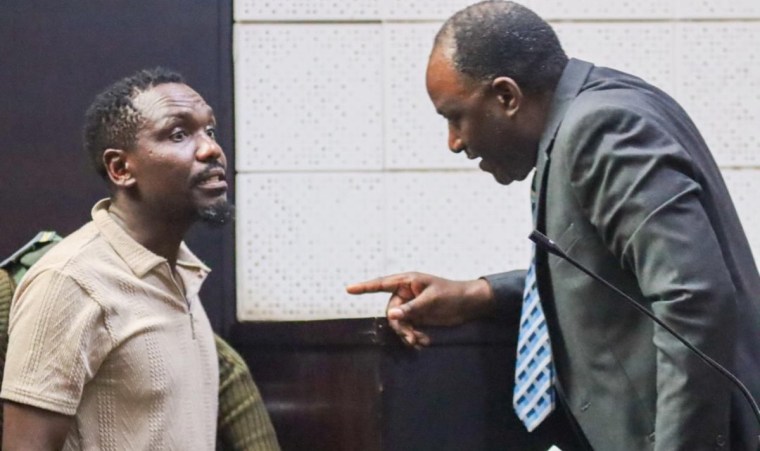Lusaka, March 27, 2025—“I have learnt that free speech, free talk, is not free,” Zimbabwean journalist Blessed Mhlanga wrote in a letter from prison, which was made public on February 28, his fourth day behind bars.
Mhlanga, who works with the privately owned broadcaster Heart and Soul TV, was arrested on February 24 and charged with incitement for covering war veterans who called for the resignation of President Emmerson Mnangagwa and opposed proposals to extend his term. If found guilty, he could be jailed for up to five years and fined up to US$700 under the 2021 Cyber and Data Protection Act.
Mhlanga remains in pretrial detention at the capital’s Harare Remand Prison, an overcrowded facility with harsh conditions considered “not fit for animals.”
Chris Mhike, the journalist’s lawyer, told CPJ that Mhlanga’s imprisonment has affected his health, with the journalist looking frail and suffering body aches. “There’s no running away from the fact that he has suffered terribly from this episode. His part-time studies are disrupted,” Mhike told CPJ, adding, “after these painful weeks in prison, his health has notably deteriorated.”
“What is happening is actually an attempt to try and make sure that we silence all journalists who are doing their work,” said Perfect Mswathi Hlongwane, secretary-general of the Zimbabwe Union of Journalists, in an interview about Mhlanga’s detention. “This is bad for the profession, this is bad for the country.”
Sanctions for people who ‘demonize’ the president
Zanu-PF, the ruling party since independence in 1980, is facing internal tensions. The party last year adopted a motion to try to amend the constitution to extend Mnangagwa’s time in office beyond the 2028 completion of his second, final term.
Amid the intraparty strife, government officials have sought to tamp down on rhetoric they view as insufficiently loyal to Mnangagwa, whether from politicians or the media. Home Affairs Minister Kazembe Kazembe recently threatened criminal sanctions against people who “insult and demonise the Office of the President,” while Information Minister Jenfan Muswere warned broadcasters against advocating for the government’s overthrow.
A war veteran that Mhlanga interviewed, Blessed Geza, was among Zanu-PF members who sharply opposed the extension. Geza was expelled from the party earlier in March and has been calling for protests. Mnangagwa says he will leave office at the end of his current term.
In its attempt to silence the press, the government is employing the tried and tested strategies of jailing independent journalists and introducing laws to restrict freedom of expression.
Prominent journalist Hopewell Chin’ono faced repeated harassment and was arrested several times in 2020 and 2021. He was initially denied bail during his latest detention, in January 2021, until Zimbabwe’s High Court freed him after three weeks in prison. Journalist Jeffrey Moyo, whose work has appeared in The New York Times and other foreign media, was also arrested and initially denied bail in 2021. After spending more than a year in prison, Moyo was convicted of breaking the country’s immigration laws and given a two-year suspended sentence.
On March 12, Muswere announced plans for new social media legislation, citing the need to regulate unethical journalism and govern “ghost accounts operated by individuals seeking to demonise their own country.”
Muswere has also sponsored the Broadcasting Services Amendment Bill, which the lower house of parliament, the National Assembly, passed on March 4. The bill, awaiting Senate approval, would entrench Mnangagwa’s control over broadcasting by removing requirements that the president consider recommendations from a parliamentary committee in appointing Broadcasting Authority of Zimbabwe board members.
‘I feel unsafe’
Even when threats don’t come from the government, failure to address press freedom violations can leave journalists fearful.
Three days after journalist Dumisani Mawere published a February 9 report on his local WhatsApp group accusing a private security employee of sexual misconduct with a minor, two of the company’s staff threatened him by phone before seeking him out at his home in the northern town of Kariba. When Mawere complained to the police, they summoned the alleged offenders, who returned to threaten the journalist, he said.

“They charged at me, pointed fingers at me, clenched their fists, and issued direct death threats — explicitly reminding me that ‘Kariba is very small,’ implying that I could easily be killed,” Mawere, a journalist with Kasambabezi community radio station, told CPJ, adding that he was frustrated that the police let the suspects go. “Right now, I feel unsafe and vulnerable in my work as a journalist.”
CPJ’s phone calls and messages to national police spokesperson Paul Nyathi, National Prosecuting Authority spokesperson Angelina Munyeriwa, and government spokesperson Nick Mangwana went unanswered.
